Optimizing Landing Pages for Startup Success
Increase the success of start-ups with Conversion Rate Optimization (CRO). Optimize landing pages...
By: Johannes Fiegenbaum on 4/30/24 11:05 AM

Meta's Conversion API is the standard for browser-independent conversion tracking. As adblockers and privacy-friendly web browsers are becoming more popular, pure pixel tracking is associated with increasing gaps and makes it more difficult to understand how products and services are used. Server-side tracking is the solution to this problem: instead of collecting data from the client (web browser), events are captured on the server side (the code that serves the website).
Setting up a conversion API: The possibilities
Server-side tagging with the Google Tag Manager
Segment, Tealium, Adobe, Shopify, Shopware, WooCommerce and co.
Data protection of the Conversion API in the context of the GDPR
Communication with data protection
Quantify conversion API benefits
Decision template for management
Server-side tracking restores transparency in terms of marketing sources and product usage, but there are several other benefits and use cases beyond that:
Based on my experience from countless Conversion API setups and audits, I would like to provide guidelines for the effective use of Meta's Conversion API in this article.
The CAPI can be set up without developer support, but a lot of potential remains untapped in the optimization of event match quality score and deduplication in conjunction with data protection. The CAPI is also highly relevant for the new meta-features such as Advantage+. Let's take a look at it in detail.
While in the early days of server-side tagging, developer coins with a cloud platform were needed to take care of bot detection, bounce rate calculations and session logics, almost every store or analytics platform now offers one-click connections that are sometimes more and sometimes less good.
For many who are at home in the Google world, the Google Tag Manager is the most obvious solution. Server-side tagging in GTM moves the tracking events from the website to a server container in a Google Cloud account. There may be costs for using the Google Cloud Platform, but often there is already a GCP account that can be used.
The Conversions API is integrated by using GA4 Web Tag and GA4 Server Client. All you need to do is update the existing Tag Manager setup to use GA4. Functionally, each defined conversion event is sent to the server client and from there to the Conversions API. There is a risk that adblockers that work heuristically will recognize and block the listener URL, as it always ends with g/collect: www.analytics.example.com/g/collect. At least the front "analytics" part can be freely selected.
One advantage is the simple connection to other platforms such as Pinterest, which do not offer their own gateway or similar. This means you can use the setup already created for Meta.
Instructions can be found here: Conversions API for Server-Side Google Tag Manager (GTM)
Not every company uses Google Tag Manager. Tealium and Segment are also frequently used systems, unless ecommerce store systems are running. Here it usually runs via small extensions ("connectors") that enable the assignment of web events to the server payload. As the meta pixel has already been integrated via an extension, this is often outdated and not CAPI-capable. In addition, you must then update to a new pixel plugin. However, there are more setting options than with Shopify, for example:
Instructions for Tealium Conversion API integration: Facebook Conversions Connector Setup Guide
Instructions for Segment Conversion API integration: Facebook Conversions API (Actions)
Guide for Adobe Conversion API integration: Meta Conversions API extension overview
Paid Shopware plugin: Facebook Pixel (Meta Pixel) & Conversion API integration
I am happy to support you with any setup of the Conversion API via the platforms mentioned.
Shopify's Conversion API integration via the official Meta extension is a black box:
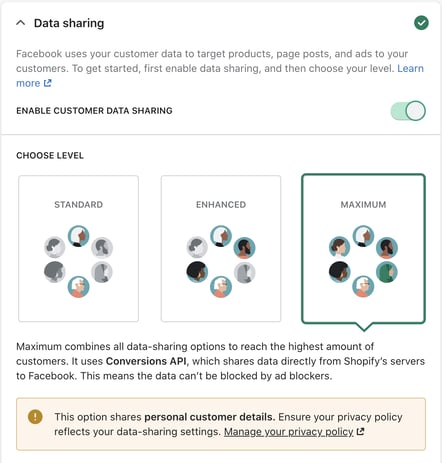
Starting with the "Enhanced" setting, your store uses Facebook's Conversion API as well as the Facebook pixel and shares these parameters: Name, location, email address and phone number. This setting can be found in the Facebook & Instagram sales channel under Data Sharing.
Metas Conversion API Gateway is the most convenient way to use the Conversion API. Even if it relies on AWS and therefore on the cloud with the highest CO2 intensity. But you can choose a Swedish server location: Green Cloud: measuring emissions from our cloud architecture.
The advantages of the gateway over the other options:
Schematically it looks like this:
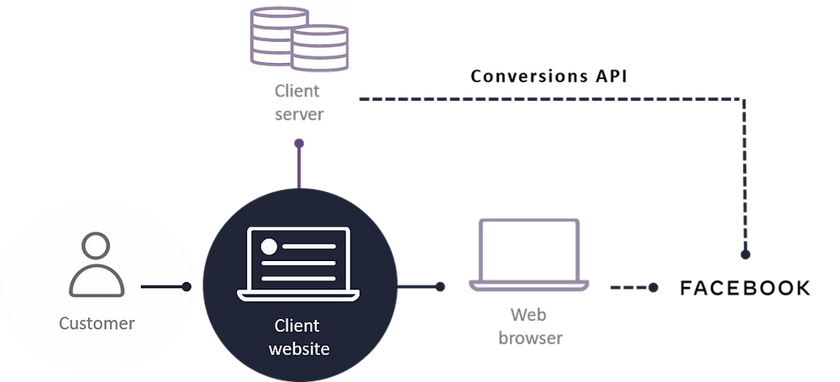
So technically it works exactly like server-side tagging with GA4 and can be set up via the Events Manager in the Business Manager.
The GDPR regulates the processing of personal data of natural persons by natural persons, companies or organizations in the EU. This also includes the use of the Conversions API. You should therefore ensure the following.
I often observe that marketing departments obtain internal approval for the Meta Conversions API without discussing which data can and may be shared with Meta. This leads to conversion API setups that come to nothing. Low event match quality score, low deduplication with the meta pixel and therefore no actual effects apart from cloud costs and expenses. Data protection should therefore be brought on board right at the start to discuss and weigh up all the parameters. This is primarily a risk assessment. But if you can only communicate risks, approval is all the more difficult.
What are the measurable benefits of the Conversion API and how can they be quantified?
Every major website uses CDN caching services such as Cloudflare or Akamai. To quantify the discrepancy between server-side and client-side tracking data, you can compare the CDN queries with the Google Analytics figures on the client side over the same period.
.png?width=840&height=417&name=stats-requests%20(1).png)
Don't forget that the time zone should be identical.
It is also possible to estimate this discrepancy using simple scripts. All you need is a script that does not collect user data or place cookies and that is loaded via the Google Tag Manager (or any other tag manager) with every website call.
To be clear, the more tech-savvy (younger, more male) the target group is, the greater the difference. We are talking about orders of magnitude of up to 30%. That's a pretty big number. 30% smaller retargeting pools, 30% less attributed advertising budget, 30% higher costs per optimization event.
I've done this a lot and can help you work out these numbers and turn them into a decision template.
From the risk assessment of data protection and the opportunity assessment of marketing, a decision template can now be created for the management in order to bring about an informed decision. You should also include the additional functions that a conversion API enables, such as conversion lift studies.
But which parameters are actually important for event match quality and deduplication?
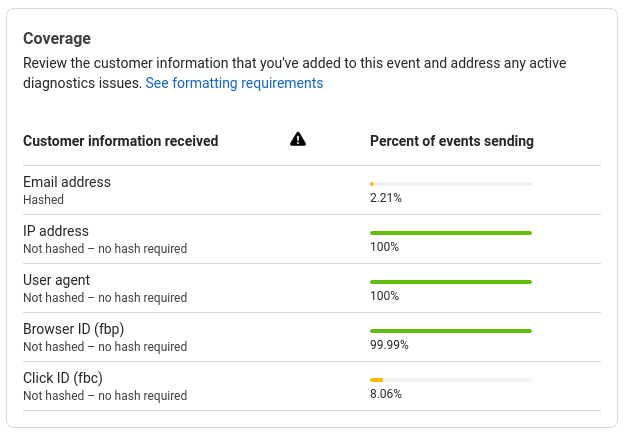
The event match quality score in the Meta Events Manager indicates how well the parameters sent with your server event can be matched with a meta account. Better event match quality means that events are more likely to be attributed to a Facebook account or Instagram account, allowing you to attribute more conversions and reduce your cost per conversion event. Only matched events can be used for ad attribution and ad placement optimization, and the higher the match quality, the better.
Meta calculates a score from zero to ten based on the quality of customer information sent for a server event and the percentage of how many are attributed to a Meta account. Your score is compared to other advertisers in the region who send the same type of event (ViewContent, AddToCart, Purchase, etc.). Meta indicates the score as "Poor", "OK", "Good" or "Great". The goal should be at least a "Good" or a 6 out of 10.
The biggest factors for a good EMQ, and good is anything above 6/10, are the following:
| Parameters | Priority |
| Hashed email | Highest |
| Client IP address/client user agent | High |
| Hashed phone number | High |
| Facebook Login ID | Medium |
|
Other hashed contact information (In addition to hashed email and phone parameters, contact information that you can send includes hashed parameters for: gender, date of birth, last name, first name, town/city, country/state, postcode/zip, country) |
Medium |
| External ID | Medium ID |
| Browser ID (fbp) | Low |
| Click ID (fbc) | Low |
| Lead ID | Low |
| Subscription ID | Low |
Quelle: https://www.facebook.com/business/help/765081237991954?id=818859032317965
With the IP address and SHA256-hashed email address, the chances of a good match rate are therefore already very good. For simpler events such as ViewContent or ViewCategory, the IP address is usually also sufficient for a good event match, and there is no email address anyway. For deeper events such as Purchase, however, the IP address alone is no longer sufficient for a good evaluation and effectiveness.
These parameters should also be sent via the Meta Pixel with the Advanced Matching function. Meta recommends automatic and manual matching - although many prefer manual matching because of the complete control. Users should also be able to approve or limit this via an opt-in and the privacy policy.
For the Google Tag Manager, this can be set up easily and clearly with the Facebook Pixel community template: Community Template Gallery: Facebook Pixel.
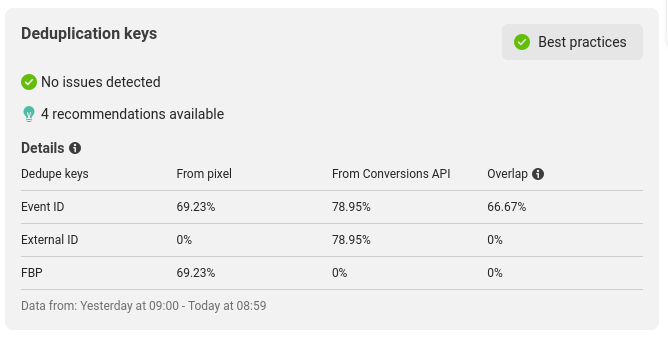
Meta attempts to deduplicate identical conversion events that are sent via the meta pixel and the Conversions API. This is done via redundant parameters that are transmitted via the pixel and the Conversions API and assign these events to each other. These are
Event ID: An order number or a transaction ID are two possible identifiers that can be used for event_id. A session ID is also possible or combinations of different parameters, such as external ID with session ID or time stamp. If these are not available, a random number can also be used (as long as the same random number is sent between browser and server events).
Event name: The simple name of the event such as ViewContent, AddToCart, Purchase.
FBP: If the Meta Pixel is used on a website and the pixel uses first-party cookies, the pixel automatically saves a unique identifier in an _fbp cookie for the website domain if no cookie already exists. This identifier looks like this:
fb.1.2996422791668.1143146470
External ID: The external ID is a string of characters that represents a user in an advertiser's system, such as loyalty membership IDs, user IDs and external cookie IDs. You can send one or more external IDs for a specific event and Meta, in combination with e.g. a hashed email address, tries to match this ID with a person on Facebook and Instagram.
FBCWhen a user clicks on a meta ad, the link sometimes contains an fbclid query parameter. If the user lands on the target website and the website has a meta pixel that uses first-party cookies, the pixel automatically stores the fbclid query parameter in an _fbc cookie for that website domain. This looks like this:
fb.1.123456741205.AbCdEfGhIjKlMnOpQrStUvWxYz1234567890
The recommendation is to rely on Event ID and Event Name because deduplication via FBP relies on less reliable cookies and is linked to other conditions.
For example, browser events must arrive before server events in order to be deduplicated. Similarly, deduplication does not take place if only one event source is specified. This means that if only the browser event contains an event source, then no deduplication takes place between the server and browser event. It is therefore better to use Event ID and Event Name.

For the sake of completeness, it should also be mentioned that events should be sent in real time if possible. You might assume this, but I had a case where all events were sent by the developer once a day, resulting in a big mess. Until we came to this actually obvious point, we were puzzling unnecessarily. However, it is possible to send the conversion events as a batch within an hour.
How does the Facebook Conversion API work?
Data is sent directly to Meta's Conversion API with a server request without a detour via the browser.
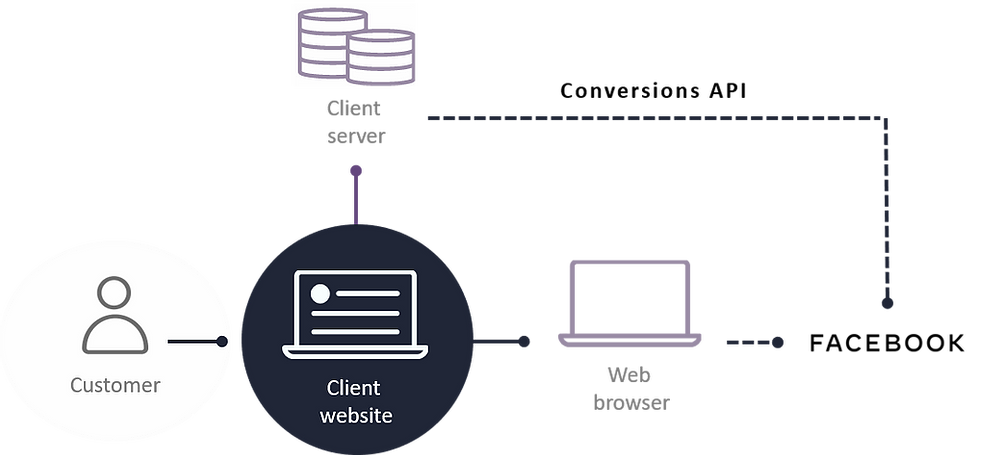
How do I set up the Facebook Conversion API?
The easiest way is to use the Conversion API Gateway in the Events Manager, unless your analytics or store service provider offers its own extension.
What types of conversion events can I track with the Facebook Conversion API?
In principle, it is possible to track all types of conversions. Including app events and offline events. The most useful events are those that are crucial for the success of the company: Purchase, Lead, AddToCart, Subscription.
What data is collected by the Facebook Conversion API?
Server Event Parameters and Customer Information Parameters.
How do I protect my data with the Facebook Conversion API?
You have full control over what data the Conversion API transmits and can thus ensure maximum protection. It is not a JavaScript that runs independently. You should also check the associated data protection recommendations such as the opt-in obligation, inclusion in the privacy policy and review of the standard contractual clauses.
How do I use the Facebook Conversion API in conjunction with Facebook Ads?
A good Conversion API integration provides redundant data that significantly improves the optimization of Facebook Ads. This reduces your costs per optimization event and makes the ads more efficient.
Incidentally, I believe that much more needs to be done to protect nature.

ESG & sustainability consultant specializing in CSRD, VSME, and climate risk analysis. 300+ projects for companies like Commerzbank, UBS, and Allianz.
More aboutIncrease the success of start-ups with Conversion Rate Optimization (CRO). Optimize landing pages...
A solid technical foundation is essential for all types of advertising and attribution. Especially...
Learn how to master Meta's Conversion API: Increase data accuracy and advertising performance. A...